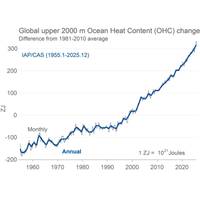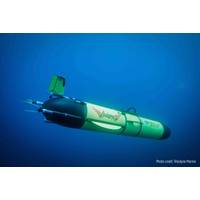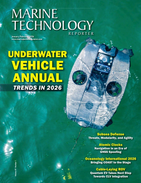
Climate Change: A Decade After the Paris Agreement
tying with 2023 as one of the warmest years ever measured.The WMO's consolidated dataset places 2025 at 1.44°C above pre‑industrial levels, ranking it among the top-three warmest years over the 176 years of recorded temperatures.ARCTIC: RAPID COLLAPSE OF SEA ICEThe U.S. National Oceanic and Atmospheric Administration’s (NOAA) 2025 Arctic Report Card confirmed that October 2024–September 2025 was the warmest period since 1900, and the region continues to warm more than twice as fast as the global average.Sea‑ice extent reached the lowest winter maximum ever recorded in March 2025

DOLGO Launches AI Platform to Document, Share Workforce Knowledge
;the vanishing aging workforce. As a measure of the scale of the problem in the United States today, the average age of shipyard workers is 55-years-old. This is against a backdrop of shipbuilding demand being set to double over the next decade.DOLGO has been spun out of the National Oceanic and Atmospheric Administration (NOAA) Ocean Enterprise Accelerator and has built its AI platform and undertaken testing with the University of South Florida’s marine science lab. The software enables workers to share knowledge, allowing companies to retain skills for new and existing engineers.Wazenn

The Metals Co Seeks International Deep Sea Mining Permit Under New Process
;mining has the potential to provide large amounts of the minerals needed for electric vehicles and the energy transition, but debate over the environmental damage it may cause has dragged on for decades and prevented licenses being issued.The U.S. Department of Commerce's National Oceanic and Atmospheric Administration on Wednesday said it would consolidate the licensing and permitting process into a single and ostensibly shorter review."Those amended regulations pave a pathway for faster permitting and us moving into commercial production sooner rather than later," Gerard Barron

HII Expands Portchester, UK Facility for Unmanned Systems
seabed mapping.Search and Recovery: Played key roles in the search for Air France Flight 447, post-tsunami response in Japan, and the discovery of USS Indianapolis (CA 35).Science and Environment: Supports environmental monitoring, marine archaeology, and oceanographic research. The National Oceanic and Atmospheric Administration is deploying REMUS 620 systems to map seafloor habitats affected by the Deepwater Horizon spill.HII ROMULUS USV Family of SystemsHII’s ROMULUS family is a modular, AI-enabled line of USVs powered by the Odyssey Autonomous Control System. The flagship, ROMULUS 190, is currently

NOAA-Led Expedition Maps Cook Islands’ Exclusive Economic Zone
Exploration Vessel Nautilus, operated by the Ocean Exploration Trust, successfully completed a three-week mission to map and explore the Cook Islands’ Exclusive Economic Zone (EEZ). This collaborative effort, led by the National Oceanic and Atmospheric Administration (NOAA) through its Ocean Exploration program and supported by a grant to the Ocean Exploration Cooperative Institute (OECI), marks a milestone in strengthening U.S.-Cook Islands partnerships in marine resource management.Guided by priorities set by the Cook Islands Seabed Minerals Authority (SBMA), the expedition employed

NOAA Invests $95M in Mid-Life Vessel Renovation
The National Oceanic and Atmospheric Administration (NOAA) awarded a $95 million contract to JAG Alaska, Inc., a shipyard based in Alaska, for a mid-life renovation of the Oscar Dyson. This project not only enhances NOAA’s operational readiness but also boosts Alaska’s economy by creating skilled jobs.A highlight of the upgrade is Siemens Energy’s SISHIP BlueDrive PlusC low-voltage direct current (LVDC) propulsion system, which improves fuel efficiency and reduces emissions. The system minimizes specific fuel consumption (g/kWh) during operations, aligning with NOAA’s

Underwater Autonomous Glider Departs to Circumnavigate the Globe
. From here there will be possible stops in Brazil and the Caribbean before heading back to Cape Cod in the U.S.Transmitting information via satellite when it surfaces every 8-12 hours, Redwing will share vital data on ocean temperature, salinity, currents, and ocean health via the National Oceanic and Atmospheric Administration’s (NOAA) global monitoring system. This will ensure that scientists, oceanographers, meteorologists, universities, and even schools worldwide will be able to access real-time results internationally, building interest in the mission.The Sentinel Redwing is a new class

Jellyfish Swarm Shutters French Nuke Plant
to warming waters and the introduction of invasive species."Jellyfish breed faster when water is warmer, and because areas like the North Sea are becoming warmer, the reproductive window is getting wider and wider," said Derek Wright, marine biology consultant with the U.S. National Oceanic and Atmospheric Administration."Jellyfish can also hitch rides on tanker ships, entering the ships' ballast tank in one port and often getting pumped out into waters halfway across the globe," he said.An invasive species known as the Asian Moon jellyfish, native to the Pacific Northwest, was

Shipwreck Windfall: ROV Expedition Captures Maritime History
last delivery in before the lake freezes up. A big storm will come through and sure enough, it’ll sink vessels.”Jason Fahy and Holly Pettus. Credit: Marley ParkerThe shipwrecks served as a founding reason for the Lake Ontario National Marine Sanctuary, designated by the National Oceanic and Atmospheric Administration (NOAA) in 2024. The organization’s website states, “As the gateway between the Great Lakes and the ocean, the maritime landscape of this area represents connections between cultures, between a nascent nation and the frontier, and of commerce, opportunity and ingenuity

 February 2026
February 2026





